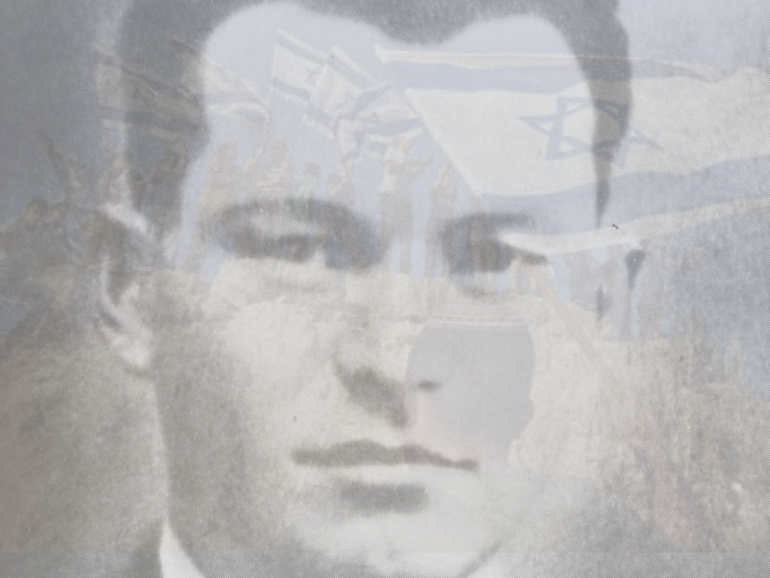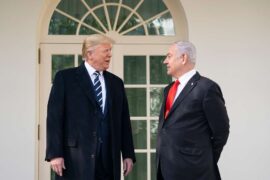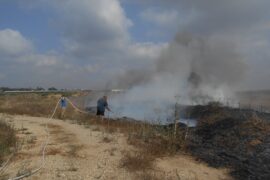The twenty-third of Iyar marks the day David Raziel fell in battle during World War II. Raziel is best known for being the commander of the Etzel (Irgun Zvai Leumi) during the late 1930s and as a model for what the modern Hebrew soldier was meant to be.
Less commonly known about Raziel was his connection to Palestine’s Chief Rabbi Avraham Yitzḥak HaKohen Kook and the yeshiva where national-religious ideology developed. He studied at Mercaz HaRav for years and was even a regular study partner of HaRav Zvi Yehuda HaKohen Kook, son and ideological successor to the chief rabbi.
Together the two learned the elder Rav Kook’s writings, specifically as applied to Israel’s national rebirth as a means to usher in a better world.
More than just being the model for the modern Hebrew soldier, Raziel can more specifically be viewed as the prototype for Israel’s national-religious community, especially those inhabiting the mountainous Samaria and Judea regions. Many of the more ideological Jewish towns and villages throughout the West Bank have bred a culture of dedication to Rav Kook’s vision and the young men growing up in these communities – like Raziel – are known to express their dedication to this vision through exceptional military service.
It was at Jerusalem’s Hebrew University that David Raziel befriended Avraham Stern and introduced him to the Torah and traditions of Israel. Stern had come from a revolutionary socialist background, growing up in the All Union Leninist Pioneer Organization (youth faction of the Russian Communist Party) at the time of the Russian Revolution, and first entering Jewish politics through the socialist Hashomer Hatzair.
Prior to meeting Raziel, Stern had been disappointed by both the Zionist left and right but was immediately inspired by Rav Kook’s messianic philosophy and – in addition to gradually taking on Jewish ritual practices – dedicated himself the task of reviving the nation of Israel. He understood the Jews to constitute a people and not a mere culture or religion as most Marxists in Europe had claimed. He recognized the children of Israel’s deep attachment to Palestine and identified British imperialism as the primary obstacle to Jewish liberation.
Stern joined Raziel in the Etzel command and the two worked together in building the nucleus of a fighting force that initially focused on defending Palestine’s Jewish community from the country’s increasingly disenfranchised and hostile Arab population. At a time when the Hagana – the semi-legal Jewish militia under the command of the Labor Zionists – practiced a policy of restraint in the face of attacks, Raziel led the Etzel in reprisals that showed terror to be a sword capable of cutting both ways.
Although committed to the same ultimate vision, Raziel and Stern began to part ways in 1939.
Raziel the soldier sought to turn the Etzel into a formidable army. But Stern the revolutionary saw more value in a clandestine underground. His background enabled him to analyze the factors standing in the way of Israel’s freedom. He identified Britain’s material interests in the region, concluded that these interests demanded permanent rule over Palestine and decided on the need for an armed struggle to free the country. In fact, by applying the revolutionary theory learned in his youth to the Jewish people as a native people victimized by British colonialism, Stern came to deeply identify with the anti-Roman rebels of the Second Temple era – even taking for himself the pen name “Yair” in honor of Masada’s Sicarii commander Elazar Ben-Yair (according to Professor Joseph Klausner – an influential teacher of Stern’s – the Sicarii were proto-communist Jewish guerrillas).
David Raziel had the long-term vision for Malkhut Yisrael as a “light unto nations” but his short-term political vision was too narrow to reach Stern’s conclusions. When World War II erupted, Stern distinguished between the German tzorer (persecutor) and the British oyev (enemy), arguing that while the Germans hated and sought to harm the Jews, the British were the true enemy for standing in the way of the Jewish mission (by occupying our homeland and preventing Jews from returning home).
These conclusions were reached prior to the Wannsee Conference at a time when German policy was merely to deport Europe’s Jews to whatever far-off country would accept them. Adept at finding common ground with anti-Semitic Polish officials, Stern suggested a diplomatic agreement with Germany that would send the persecuted Jews to Palestine in exchange for the Etzel’s cooperation against England. But with or without such an agreement, Stern concluded that all efforts should focus on fighting British rule, for the sake of both freeing the homeland and rescuing Europe’s Jews.
Lacking the analytical training to recognize the inherent contradiction between Jewish and British interests, Raziel accepted upon himself the political authority of Z’ev Jabotinsky and placed the Etzel at the disposal of the British war effort.
Rejecting Jabotinsky’s leadership, Stern demanded a Jewish war aim in exchange for assisting the British. He felt that without a commitment from London to either open Palestine’s gates to Jewish refugees or commit to a Hebrew state following the war, fighting for the British was betraying the Jewish cause.
From Raziel’s perspective, the Nazis were the primary foe, and therefore the British should be aided in their war effort against Germany. But because Stern and his followers viewed the Jewish people not as an object with a problem (anti-Semitism, persecution, etc.) but rather as a subject with desires (independence in Jerusalem), they were able to recognize the necessity of an immediate anti-British struggle.
The Sternists broke away from the Etzel and created a revolutionary underground dedicated to freeing Palestine from foreign rule. Although his knowledge of Torah was clearly deeper and broader than Stern’s, Raziel lacked the analytical tools to recognize the moves that would bring Israel closer to the ultimate goal both men shared.
Even how each man gave his life was deeply emblematic. Raziel fell in battle on foreign soil wearing a British uniform. Stern, by contrast, was shot dead while handcuffed by British detectives in Tel Aviv.
Hunted by the regime and driven by the symbolism of their leader’s demise, Stern’s small band of followers – the Fighters for the Freedom of Israel – possessed the strategic understanding to make each move count.
Every explosion, every shot fired and every word of propaganda pasted to the walls of urban centers was geared towards very specific short- and long-term goals:
- Forcing the British into a policy of collective punishment to maintain security.
- Fostering general hostility towards the empire among the populace.
- Dragging the Etzel (and even briefly the Hagana) behind them in their anti-colonial struggle.
- Finding points of common cause with progressive and revolutionary forces in the Arab world.
- Generating global sympathy – especially on the left – for their struggle for freedom.
- Making the price of ruling Palestine more expensive for the British than the benefits of exploitation.
Applying the same analysis as their martyred leader, the Sternists identified the empire’s material interests in the region and attacked those interests until retreat became England’s best strategic option. Official British documents attest to the fact that it was “Jewish terrorism” that decisively forced the empire’s withdrawal from Palestine.
Israel’s contemporary national-religious sector, of which I am part, shares much in common with David Raziel – emuna, long-term vision and a readiness to sacrifice. Our boys serve with distinction in Israel’s most elite combat units and we’ve successfully made a “two-state solution” impractical through our efforts to populate the West Bank with Jews.
But like Raziel, most of us lack the political sophistication to recognize the material factors driving efforts to divide our country or to formulate effective strategies to advance Israel closer to our vision. The constant electoral underperformance of national-religious political parties and our failure to save Gush Katif in 2005 are perhaps the clearest examples of this flaw. Despite the many arguments focused on the scope and boundaries of our resistance, no one presented a sound strategy for how to effectively stop Ariel Sharon’s Disengagement plan. No one properly identified the material conditions and pressures driving Sharon to act as he did and no one put forward a comprehensive strategy to prevent the expulsion from being carried out.
There are questions the national-religious sector desperately needs to ask:
- Is it possible to increase our political representation without diluting ideology?
- How have the Israeli and Palestinian ruling classes benefited from the Oslo process?
- How is promoting a two-state paradigm in their interests?
- How is such a policy of partitioning our country in the regional interests of the United States and why does Washington push so aggressively for it?
- In what way does accepting American aid make our leaders subordinate to Washington and vulnerable to pressure to surrender our heartland?
- What material conditions are driving Jews and Palestinians into conflict?
- Must Palestinian grievances be rejected out of hand or could they somehow become part of advancing Jewish liberation?
- If the forces of westernization within Israeli society have used the Palestinian cause to advance their agenda for decades, couldn’t those loyal to Eretz Yisrael and Jewish identity potentially do the same (especially now that partitioning the land has become impossible)?
- Could successful engagement with Palestinian activists lead to a shared struggle based on mutual interests?
- How can we transform our socio-cultural unity with the Israeli periphery into a dependable political alliance?
- How can we build stronger bases of support amongst the general population?
- Can the struggles for Eretz Yisrael and Jewish identity be communicated to the world in a language that would at the very least generate broad-based critical support?
- Is a relationship with American Evangelicals desirable or dangerous?
- With whom should political alliances be sought?
- Is reality truly as simple as “those giving us money are our friends and those fighting against us our enemies” or should we carefully discern our own national interests, identify who might share common interests and then create the proper conditions to enable an alliance?
In addition to raising another generation of scholars and dedicated soldiers, Israel’s national-religious sector must develop sophisticated political leadership. Rather than follow the modern-day Jabotinskys into some fantasy of Israel as an outpost of Western civilization, we need to analyze the real obstacles standing in the way of Israel’s destiny and formulate the most effective means of overcoming those challenges.
David Raziel, the prototype for our most courageous and dedicated young men, teaches us a valuable and tragic lesson. If we don’t learn to think outside-the-box and start questioning the basic assumptions behind most of our political conclusions, we can easily lose our way and unwittingly betray the struggle we’ve committed our lives to.
Dedication to a higher purpose and the willingness to sacrifice for a greater vision might make us a powerful force in Israeli society. But a sophisticated analysis of our situation and the ability to formulate effective political strategies are crucial to advancing to the next stage of our people’s liberation.






I believe that the Marxist analysis of the human condition is false as well as unhelpful to all people, but especially to the Jewish people. The world’s population is not divided into two classes, the “bourgeoisie” and the “proletarit,” as Marxist theory holds. Neither is the human race divided into “oppressed” and “oppressors.” The very same individual might be an “oppressor” in one context, and “oppressed” in a different context or in a different way. Some individuals do not fit into either ccategory. Hundreds of millions of people are neither “proletarians,” as Marxists understand this term (meaning mainly industrial workers who work for wages), nor “bourgeois” (a very vague term in Marxist usage, referring to almost anyone who is comfortably off financially). Marx’s simplistic analysis of the world’s problems and the divisions and conflicts that exist between different groups of people is not factual. Even worse, however, are the Marxists claims that “class war” is the solution to the world’s problems. No warfare is a soklution to the world’s problems. A genuinely progressive and humanitarian philosophy would aim to bring people together rather than divide them.
For the Jewish people, seeking to divide them between “proletariat” and “bourgeoisie” is extremely damaging to the unity of the Jewish people, without which there can be no survival of the Jewish people. It is also unrealistic and non-factual. Only a small minority of the Jewish people are industrial workers. Even more relevant is that upward mobility, and a desire to improve one’s social status and the material condition of oneself and one’s family,is universal among Jews, and is an enduring cultural trait. As a result, even Jews who are industrial workers strive to become “bourgeois” in the sense of finding more financially rewarding employment or self-employment, and in most instances performing non-manual skilled labor. As a result, few Jewish families remain “proletarians” for moe than one or two generations. That includes families with leftist political backgrounds as much as any other Jewish families! A truly progressive Jewish philosophy must strive first to unify a l l Jews, regardless of class status or income level, and then to unify all of the world’s people, of whatver class, race, nationality, or faith, around commitment to “truth, justice, and peace”–which the Jewish sages have declared to be the three pillars of the world.